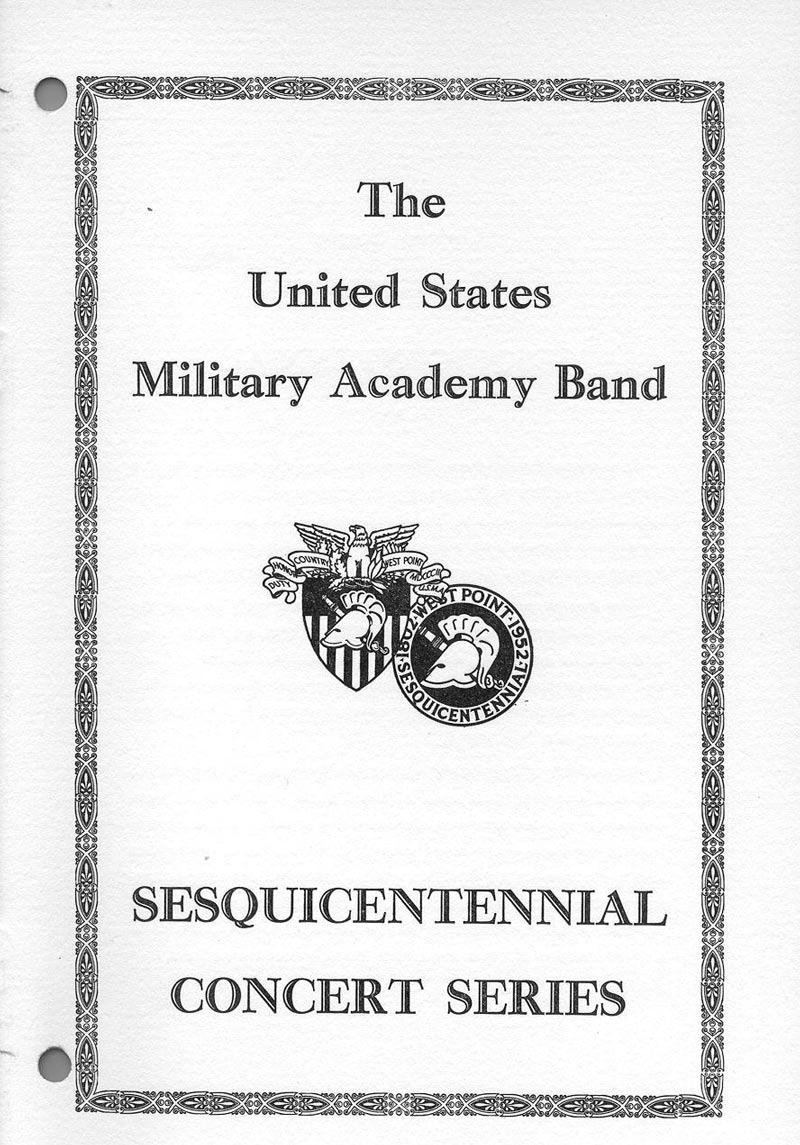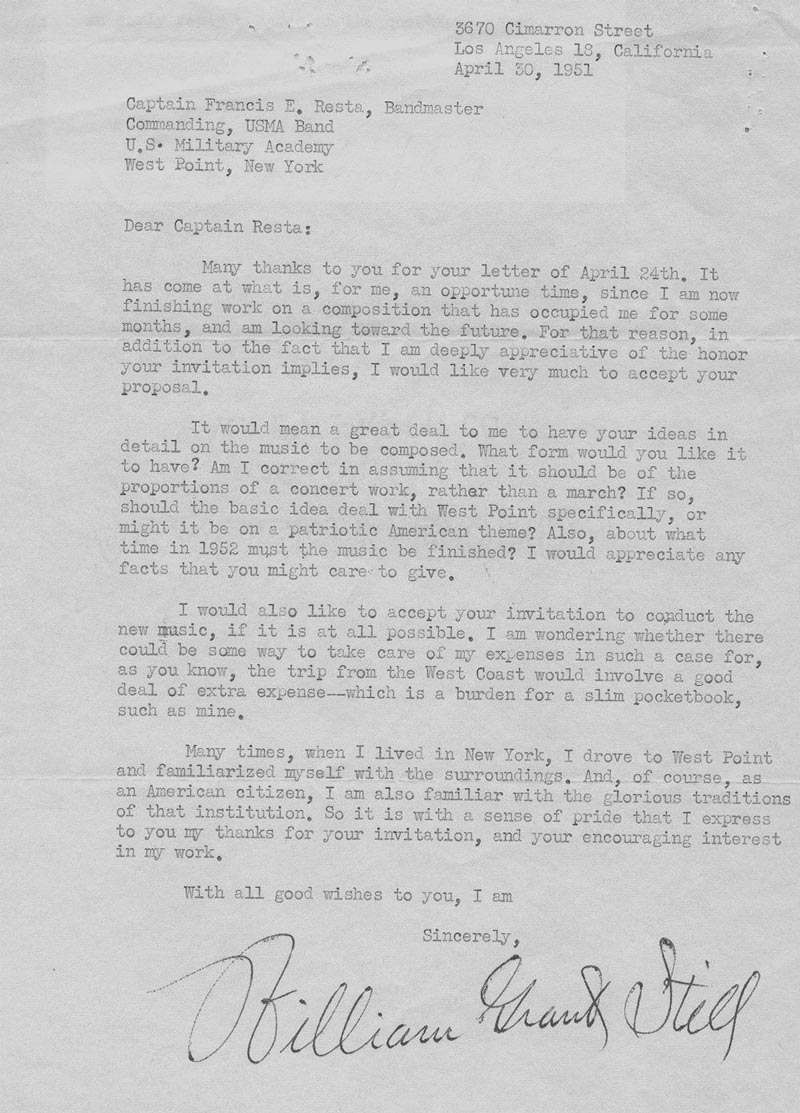In recognition of Black History Month, we’re looking back on a great contribution to our repertoire, written by one of the world’s most celebrated Black composers. Here’s the story behind the man and the piece — with a newly recovered recording to boot!
In 1952, William Grant Still became the first Black composer to be commissioned by the West Point Band. On February 17 of that year, he also became the first Black man to lead the band when he conducted the premiere of his work To You, America! at the band’s sesquicentennial celebration performance.

By this point in his career, William Grant Still, then in his fifties, had already made a name for himself as an accomplished composer and conductor. He was driven by a distinct dream for his country — one that was influenced by both the Harlem Renaissance and his military service. In 1918 amid World War One, Still enlisted in the U.S. Navy to serve as a mess attendant, which was one of only two jobs offered to Black men at the time. However, after it was discovered that he could play the violin, he was regularly relieved of his mess responsibilities to perform for officers' meals.
After he'd completed his service, Still moved to New York City where he quickly established his prominent role in the varied musical activities of Harlem, ranging from jazz to popular music, classical, and musical theater. He worked with Handy Brothers Music Co. (owned by “Father of the Blues” W.C. Handy) and the Clef Club orchestras (founded by the famed leader of the Harlem Hellfighters Band, James Reese Europe). He also played oboe in the musical pit for Shuffle Along by Noble Sissel, who was also a former Harlem Hellfighters Band member.
As a composer, Still joined other Americans in attempting to create a body of art music in our young nation that would be more reflective of American culture and of equal quality to that of Europe. Still would often set the poetry of prominent Black writers like Paul Lawrence Dunbar and Langston Hughes to his original music adapted from spirituals, working to promote the Black American idiom as an important facet of the world's musical culture.
Still took to heart the ideas of influential Harlem Renaissance writers like W.E.B. Dubois, who promoted music and the arts as important vessels for racial progress but lamented that spirituals had been “neglected [...] persistently mistaken and misunderstood.”(1) Dubois considered them to be the “single spiritual heritage of the nation and the greatest gift of the Negro people,”(1) and believed that the key to unlocking equality and full participation in American culture was through creating new and unique works of art.
In truth, these goals were not far off from those of Capt. Francis Resta, who began his tenure as West Point’s Teacher of Music and Commander of the West Point Band in 1934. The band’s role prior to his appointment focused solely on supporting the Corps of Cadets and the Academy, but under Resta’s leadership, the band transformed from a utilitarian organization to one that cultivated artistic expression with its appearances.

The Academy’s Sesquicentennial Celebration of 1952 offered, in Resta’s eyes, a unique opportunity to prove the American medium was not only immensely capable of expression, but also worthy of serious artistic repertoire. Rather than the usual programs of military march music and orchestral transcriptions, Resta used this event to establish a repertoire that was composed specifically for wind band, sending a powerful message in promotion of a uniquely American body of music.
With the publicity that surrounded the Sesquicentennial Celebration, Resta was able to solicit new works by several of the world’s most respected composers, including William Grant Still. The resulting 13 new compositions marked the first time a wind band would commission a body of work for itself. Still’s composition, To You, America!, premiered in USMA’s sesquicentennial year during the band’s Winter Concert Series.
Of the eight works on that concert’s program, four were composed by Americans: Clair Musser, Aaron Copland, H. Lynn Arison (the West Point Band’s Deputy Commander), and William Grant Still. It seems noteworthy that Copland’s 1942 work for orchestra and narrator, Lincoln Portrait, was programmed alongside Still’s work. Composed of American folksongs accompanied by a narration of poignant excerpts from Lincoln’s speeches, it set the tone for the premiere that was to come after intermission. Here’s a selection of quotes from the piece:
It is the eternal struggle between two principles, right and wrong, throughout the world. It is the same spirit that says, “you toil and work and earn bread, and I'll eat it.” No matter in what shape it comes, whether from the mouth of a king who seeks to bestride the people of his own nation, and live by the fruit of their labor, or from one race of men as an apology for enslaving another race, it is the same tyrannical principle.
As I would not be a slave, so I would not be a master. This expresses my idea of democracy. Whatever differs from this, to the extent of the difference, is no democracy.
Still’s words on To You, America! appeared in the program notes:
As for the composition I have written for West Point—it is a simple reaffirmation of the faith which all of us who are loyal Americans feel at this crucial time—our faith in our country and in its future. Musically speaking, it is a development of a single theme, energetic at the beginning and progressing to a majestic, choral-like Finale, pointing to a glorious destiny.
This was not the first time that Still addressed his wish for America in his music. He wrote In Memoriam: The Colored Soldiers Who Died for Democracy in 1943 and said, “I also hope that our tribute to those who died will make the democracy for which they fought greater and broader than it has ever been before.”(2)
The West Point Band performed To You, America! two more times after the premiere. Once at the Pittsburgh International Contemporary Music Festival in November of 1952, and again on tour to Pasadena, California, in 1954. To You, America! was published by Southern Music (now PeerMusic Classical) in 1954, and it won a Freedoms Foundation Award the same year. Unfortunately, however, the piece has since fallen into obscurity, and no publicly available recordings of the work existed...until today!
After correspondence with archives, libraries, and radio stations from all over the country, we are excited to present this historic recording of To You, America!, recorded by the West Point Band in 1952 at the Pittsburgh International Contemporary Music Festival — many thanks to the Maureen and Mike Mansfield Library at the University of Montana for lending us this recording from their archives.
As leaders of the Harlem Renaissance wrote — and William Grant Still made heard through music — the arts play a crucial role in reinforcing the democratic ideals upon which our nation was founded. We in the West Point Band are looking forward to unearthing more of these meaningful cultural moments from our history in celebration of the musical heritage of all Americans.
We hope you enjoy this historic recording, made publicly available for the first time!
Harper, Lawrence Dale. “The Sesquicentennial Celebration Wind Band Commissions of The United States Military Academy at West Point, 1952.” Doctoral Dissertation Submitted to Michigan State University (1987), 1987, www.ldharper.com/articles.html.
Kushner, David Z. “The Multifaceted Nationalism of William Grant Still.” American Music Teacher, vol. 52, no. 1, 2002, pp. 32–95. JSTOR, www.jstor.org/stable/43546206. Accessed 11 Feb. 2021.
Murchison, Gayle. “‘Dean of Afro-American Composers’ or ‘Harlem Renaissance Man’: ‘The New Negro’ and the Musical Poetics of William Grant Still.” The Arkansas Historical Quarterly, vol. 53, no. 1, 1994, pp. 42–74. JSTOR, www.jstor.org/stable/40030871.
Southern, Eileen, and William Grant Still. “William Grant Still.” The Black Perspective in Music, vol. 3, no. 2, 1975, pp. 165–176. JSTOR, www.jstor.org/stable/1214286.